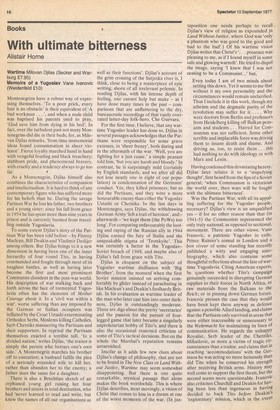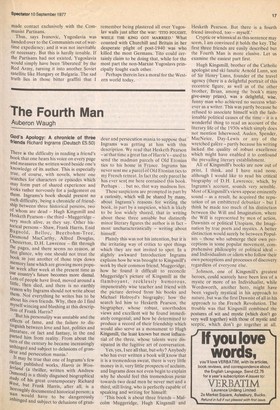Books
With ultimate bitterness
Alistair Home
Wartime Milovan Djilas (Seeker and Warburg £7.95) Memoirs of a Yugoslav Vane lvanovic (Weidenfeld £10) Montenegrins have a robust way of expressing themselves. `To a poor prick, every hair is an obstacle' is their equivalent of 'A bad workman . ', and when a male child was baptised his parents used to pray, 'God save him from dying in his bed'. In fact, over the turbulent past not many Montenegrins did die in their beds; for, as Milovan Djilas remarks, 'from time immemorial ideas found consummation in sheer violence'. Fierce loyalty marched hand in hand with vengeful feuding and black treachery; stubborn pride, and phenomenal bravery, with cruelty and a tendency always to go too far: As a Montenegrin, Djilas himself also combines the characteristics of compassion and intellectualism. It is hard to think of any contemporary figure who has suffered more for his beliefs than he. During the savage Partisan War he lost his father, two brothers and a young sister; since his fall from grace in 1954 he has spent more than nine years in prison and is currently banned from travelling outside Yugoslavia.
To some extent .Djilas's story of the Partisan War has been told before — by Fitzroy Maclean, Bill Deakin and Vladimir Dedijer among others. But Djilas brings to it a new dimension in having been one of the inner hierarchy of four round Tito, in having commanded and fought through most of its toughest battles, as well as having later become the first and most prominent Communist dissident in the post-war world. His des,Cription of war stalking back and forth across the face of tormented Yugoslavia often has the elements of Mother Courage about it. In a 'civil war within a war', worse suffering than any imposed by the German or Italian occupiers was inflicted by the Croat Ustashi exterminating Orthodox Serbs, Moslems killing Catholics, Serb Chetniks massacring the Partisans and their supporters. In reprisal the Partisans themselves exacted a terrible toll. 'In a divided nation,' writes Djilas, 'the traitor is simply the person who betrays one's own side.' A Montenegrin marches his brother off to execution; a husband fulfils the plea of a seriously wounded wife to kill her, rather than abandon her to the enemy; a father does the same for a daughter.
There is also a Brechtian sketch of an orphaned young girl raising her four brothers and sisters in total destitution, who had 'never learned to read and write, but knew the names of all our organisations as well as their functions'. Djilas's account of the grim crossing of the Sutjeska river is, I think, close to being a masterpiece of epic writing, shorn of all irrelevant polemic. In reading Djilas, with his intense depth of feeling, one cannot help but make — as I have done many times in the past — comparisons that are unflattering to the dry, bureaucratic recordings of that vastly overrated latter-day folk-hero, Che Guevara.
For the first time, I believe, that any wartime Yugoslav leader has done so, Djilas in several passages acknowledges that the Partisans were responsible for some grave excesses, in 'sheer frenzy', both during and in the aftermath of the war, 'Well, you are fighting for a just cause,' a simple peasant told him, 'but you are harsh and bloody.' In contrast, he is surprisingly mild (certainly by English standards, and we after all did not lose nearly one in eight of our population) in condemnation of the Germans' conduct. Yes, they killed prisoners; but so did the Partisans, and they were a more honourable enemy than either the Yugoslav Ustashi or Chetniks. In the last days in Montenegro, says Djilas, the withdrawing German Army 'left a trail of heroism', and— afterwards — 'we kept them (the PoWs) too long'. For comparing unfavourably the looting and raping of the Russian ally in 1944 Djilas earned the fury of Stalin and the unspeakable stigma of 'Trotskyite'. This was certainly a factor in the Yugoslav— Soviet breach of 1948, and maybe also of Djilas's fall from grace with Tito.
Djilas is eloquent on the subject of Yugoslav wartime disillusion with 'Big Brother', from the moment when the first Soviet mission insisted on arriving comfortably by glider instead of parachuting in like Maclean's and Deakin's foolhardy British. In his evaluation as wartime leader of the man who later cast him into outer darkness, Djilas is outstandingly moderate. There are digs about the pretty 'secretaries' and the passion for the pursuit of fourlegged game that later became a singularly unproletarian hobby of Tito's, and there is also the occasional reasoned criticism of some of Tito's tactical decisions. But on the whole the 1VlarShal's reputation remains untarnished.
Insofar as it adds few new clues about Djilas's change of philosophy, that are not to be found in The New Class or Land Without Justice, Wartime may seem somewhat disappointing. But there is one quite remarkable, mystical passage that alone makes the book worthwhile. This is where Djilas describes, most movingly, a vision of Christ that comes to him in a dream at one of the worst moments of the war, (In jux taposition one needs perhaps to recall Djilas's view of religion as expounded Land Without Justice, where God was 'only a phantom who was good to the good and bad to the bad'.) Of his wartime vision Djilas writes that Christ's . . presence was pleasing to me, as if I found myself in some safe and glowing warmth'. He tried to dispel the image, saying 'I knew that I was not ceasing to be a Communist...' but., Even today I am of two minds about setting this down. Yet it seems to me that without it my own personality and the circumstances would remain unclari fled. Thus I include it in this work, though my atheism and the dogmatic purity of the revolution may suffer for it . . Why were doctors from Berlin and professors from Heidelberg killing off Balkan peasants and students . . . Hatred for Communism was not sufficient. Some other terrible and implacable force was driving them to insane death and shame. And driving us, too, to resist them . • this had nothing to do with ideology or with Marx and Lenin.
Having confessed this devastating heresy, Djilas later relates it to a 'stupefying thought', first heard from the lips of a Soviet general; 'when Communism is victorious the world over, then wars will be fought with the ultimate bitterness'.
Was the Partisan War, with all its appalling suffering for the Yugoslav people, necessary? Djilas's view is an unqualified yes — if for no other reason than that (in 1941-5) the Communists represented the only truly national, as opposed to sectional, movement. There are other views. Vane Ivanovic, a patriotic Yugoslav in exile, Prince Rainier's consul in London and a bon viveur of some standing has recently published a witty and engaging autobiography, which also contains some thoughtful reflections about the fate of wartime Yugoslavia. Citing American experts, he questions whether Tito's campaign genuinely succeeded in disrupting German supplies to their forces in North Africa, or raw materials from the Balkans to the Reich; or in pinning down German forces. Ivanovic presses the case that they would have been kept there anyway as defence against a possible Allied landing, and claims that the Partisans only survived in areas that were either inaccessible or unnecessary to the Wehrmacht for maintaining its lines of communication. He regards the unhapPY Royalist, Serb leader of the Chetniks. Mihailovic, as more a victim of tragic circumstances than a traitor, and claims that in reaching 'accommodations' with the Germans he was acting no more heinously than did Tito when he conserved his strength after receiving British arms. History may well come to support the first thesis, but the second seems more questionable. Ivanovic also criticises Churchill and Deakin for having been less than ingenuous in having decided to back Tito before Deakin s 'exploratory' mission, which in the event made contact exclusively with the Communist Partisans.
Thus, says Ivanovic, Yugoslavia was handed over to the Communists out of wartime expediency; and it was not inevitable or necessary. But this is hardly tenable. If the Partisans had not existed, Yugoslavia would simply have been `liberated' by the Red Army, turning it into another Soviet satellite like Hungary or Bulgaria. The sad truth lies in those bitter graffiti that I remember being plastered all over Yugoslav walls just after the war: 'TITO FOUGHT, WHILE THE KING GOT MARRIED.' What counted with Churchill and Britain in her desperate plight of post-1940 was who killed the most Germans. Tito could certainly claim to be doing that, while for the most part the non-Marxist Yugoslays principally fought each other.
Perhaps therein lies a moral for the Western world today,































 Previous page
Previous page